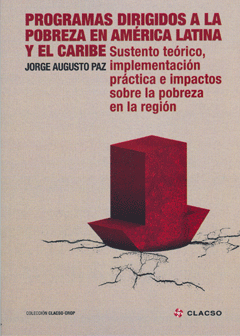Programas dirigidos a la pobreza en América Latina y el Caribe. Sustento teórico, implementación práctica e impactos sobre la pobreza en la región.

Jorge Augusto PAZ. CLACSO-CROP Series CLACSO, Buenos Aires, August 2010.
The author analyses two big groups of programmes focused on poverty reduction: poverty reduction strategies (PRS) and conditional cash transfer (CCT). These were implemented in Latin America and the Caribbean between 1995 and 2005. It is argued that the PRS are based in the conceptual framework of human capital, where, education and good health of the persons not only are essential in order to achieve economic growth, but also key for breaking the vicious circle of poverty and inequality. Most PRS’ seems to concentrate on the importance of a protection of a substantial proportion of the most vulnerable part of the population. This is combined with short term alleviation of poverty with long-term objectives such as strengthening education and health among the beneficiaries, in particular children. Even though the base for this conceptual framework, nor its impacts (which appears to be positive with respect to reducing income poverty in the short term and increase in school attendance as well as vaccination of children) are discussed, a relation between this vision and concrete public policies undertaken by governments to combat (mitigate, reduce and/or eradicate poverty) is established.







